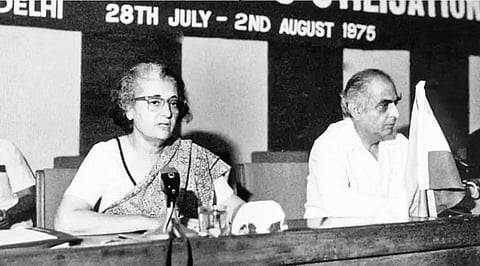'The Scam That Shook a Nation: The Nagarwala Scandal' book review: Echoes of deceit
Prakash Patra and Rasheed Kidwai’s book, The Scam That Shook a Nation: The Nagarwala Scandal plunges readers into one of India’s most sensational financial scandals. This well-researched political thriller masterfully intertwines elements of history, crime and political drama, transporting readers to the tumultuous early 1970s during Prime Minister Indira Gandhi’s tenure. Gandhi was a towering figure at the time, having just led India to victory in the Bangladesh Liberation War, solidifying her image as a decisive leader.
The narrative revolves around Rustam Sohrab Nagarwala, a retired Indian Army captain who orchestrated a massive con in 1971. On May 24 of that year, Ved Prakash Malhotra, the head cashier at the State Bank of India’s Parliament Street branch, received a phone call from someone convincingly impersonating Gandhi. The caller instructed Malhotra to hand over Rs 60 lakh to a courier for a secret mission related to the liberation struggle of East Pakistan, now Bangladesh. Patra and Kidwai note, “In 1971, the sum of Rs 60 lakh was no joke… the amount would have been Rs 170.62 crore in 2024.” Believing he was acting under the PM’s orders, Malhotra complied, only to discover he had been duped when no such instructions were confirmed at the PMO.
Following the revelation of the scam, a complaint was filed at the Chanakyapuri police station. SHO Hari Dev swiftly apprehended Nagarwala with most of the money at Delhi Airport. Despite Nagarwala’s subsequent four-year prison sentence, his sudden death in Tihar Jail ignited numerous conspiracy theories. The scandal, marked by the suspicious deaths of both Nagarwala and the investigating officer DK Kashyap, fuelled widespread speculation about potential higher-level involvement, and Gandhi’s silence on the matter further stoked suspicions. The case, scrutinised by the Justice Jaganmohan Reddy Commission set up by the Morarji Desai government in 1978, failed to implicate Gandhi conclusively, yet questions persisted.
The 11th chapter of the book is particularly poignant as it focuses on the human side of the main perpetrator, Nagarwala. His letters from the hospital to his mother, Goolbai, reveal a man who, despite his criminal acts, was deeply concerned about his family. The emotional exchange between mother and son, especially Goolbai’s heartfelt plea to the PM, adds a layer of tragedy to the already complex narrative. In a letter to Gandhi, Goolbai wrote, “Please forgive me, but somehow I feel that
a broken-hearted old mother’s appeal to another mother and a woman who has borne the burden of caring for 10 million hapless human beings will not be in vain.” This appeal, however, went unanswered, highlighting the cold, bureaucratic indifference that often accompanies political scandals.
The 1970s were indeed a watershed period for Indian politics. The decade saw Pakistan’s division and subsequent war. The country also went nuclear, witnessed a decline in political morality, and saw the rise of a coalition of opposition parties, including those aligned with right-wing ideologies. Against this backdrop, the Nagarwala affair left the nation in collective disbelief, underscoring the era’s volatility. This period also set the stage for the controversial Emergency (1975-77)—21 months marked by significant curtailment of civil liberties.
The Nagarwala Scandal significantly marred Gandhi’s reputation, playing a pivotal role in her electoral defeat in 1977. Even decades later, the case remains veiled in mystery, with many questions left unanswered. Patra and Kidwai delve deep into police records, contemporary newspaper reports, National Archives files, and the exhaustive 820-page report of the Reddy Commission. The authors also explore the possibility of CIA involvement, prompting readers to contemplate the intricacies of this complex case. They highlight how the investigation was unusually swift, raising further suspicions about the identities of the true culprits.
The book is not just a recounting of historical events but a compelling narrative that could inspire a gripping Bollywood production. Patra and Kidwai’s work is a must-read for those interested in India’s political history and the dynamics of power and corruption. The case’s detailed legal and financial aspects could also make it attractive for readers from various professions. It will particularly resonate with the working-age generation who lived through this economic and political storm.
While the meticulous research and effort to present facts as they occurred allow readers to draw their own conclusions about this enduring mystery, the lucid language makes it accessible and engaging. However, it is essential to note that financial systems, like Indian politics, have evolved significantly over the past few decades, making the book primarily of interest as a historical account. It will appeal to those who wish to delve deeper into the scandal’s details and brush up their memories.
The Scam That Shook a Nation: The Nagarwala Scandal
By: Rasheed Kidwai, Prakash Patra
Publisher: HarperCollins
Pages: 232
Price: Rs 399

